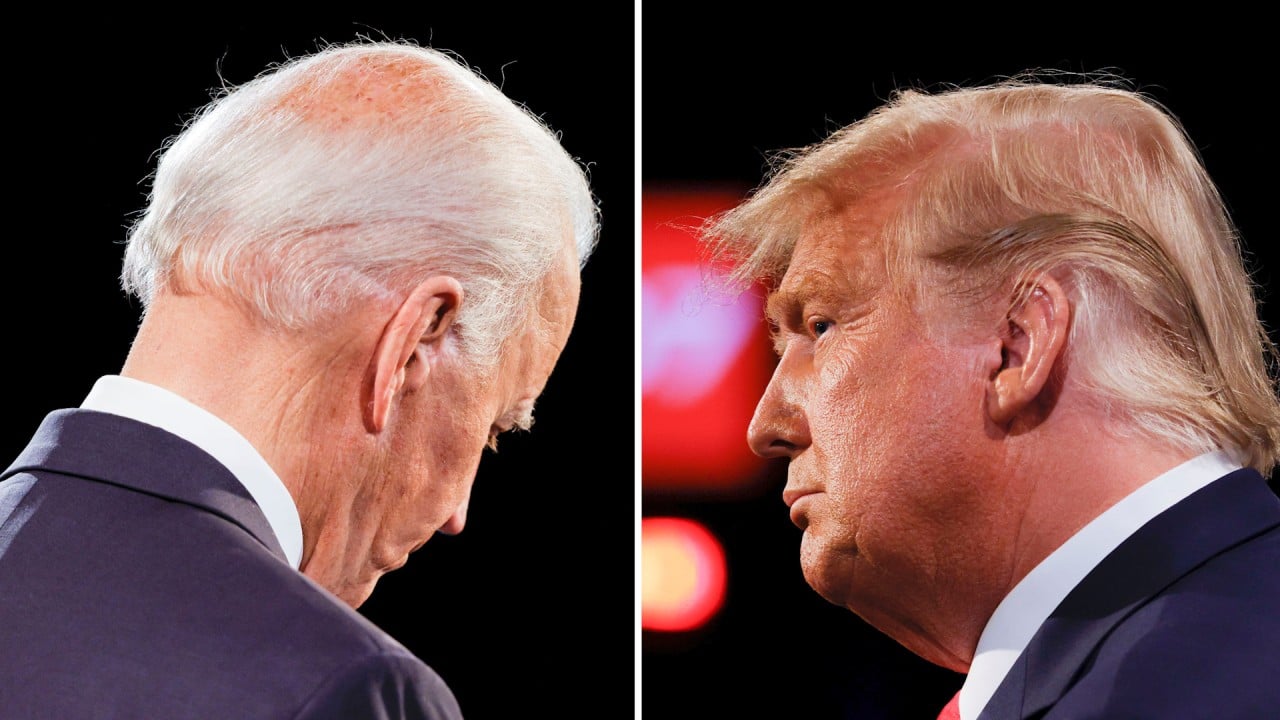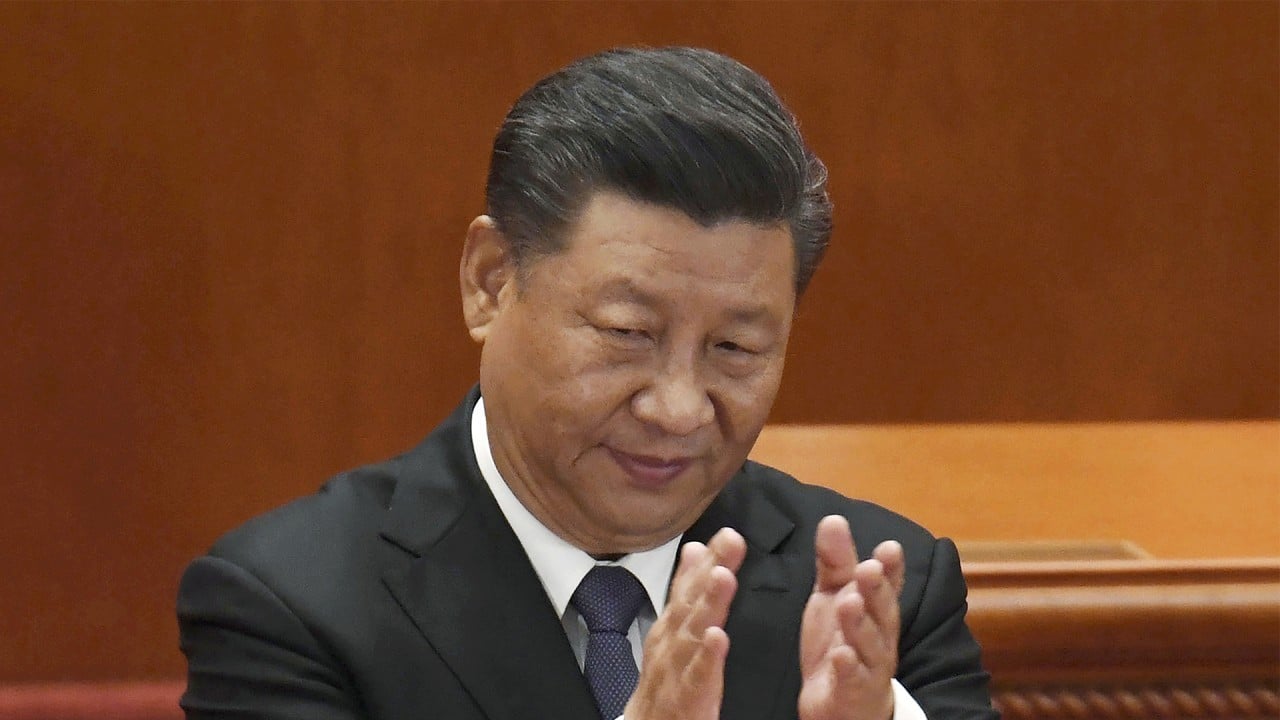
China on alert as post-election US threatens turbulent times ahead
- Close result, regardless of outcome, could give new life to anti-China conspiracies between now and inauguration day
- Beijing’s priority is to avoid confrontation and military conflict with Washington in ‘dangerous times’
As voters in the United States prepare for the presidential election, the South China Morning Post is exploring the potential ramifications for China. The latest part of the US election series looks at the possible impacts of a close result, regardless of who wins the race for the White House.
The Chinese leadership is making it a priority to avoid confrontation and military conflict with Washington, they say, with increasing turbulence expected between now and the winner’s inauguration on January 20.
“Both candidates have a knack of using China as a sort of punching bag during their campaigns and they are expected to continue playing the China-bashing card, especially right after the election,” said a Chinese government adviser who declined to be named due to the sensitivity of the matter.
“Should there be a crisis over the US election outcome, it will be a high-risk period for bilateral relations, risking another turn for the worse towards conflict, especially under Trump’s watch,” he said.
While not many experts believe Biden is personally antagonistic towards China, his stinging remarks illustrated a shift in the Democratic establishment towards a bipartisan consensus that Beijing poses a primary long-term threat to the US.

10:08
Final US presidential debate for Trump and Biden covers Covid-19, China and ‘thug’ Kim
If there was a lesson from the final debate, it was that China was increasingly seen as a domestic issue for Americans, according to Deng Yuwen, a former editor of the Central Party School’s Study Times newspaper who is now a US-based observer. “No-one can afford not to take a stance on China-related issues,” he said.
“If he thinks he could benefit from chaos, Trump may want to stir up trouble or even provoke China into a conflict. There could be November or December surprises ahead of us.”
Bonnie Glaser, a senior adviser for Asia and director of the China Power Project at Washington’s Centre for Strategic and International Studies, challenged this argument.
“It is a mistake to interpret US policy towards China as driven solely by Trump’s domestic political needs. Such an argument absolves China of any responsibility for its actions,” she said.
China policy key factor driving Hong Kong interest in US election
Philippe Le Corre, a non-resident fellow in the Europe and Asia programmes at the Carnegie Endowment for International Peace, also disagreed with the Chinese experts. “I doubt the China issue will be central once the election is over in the US. It will be mainly domestic politics over geopolitics,” he said. But he shared their assessment of potential disruption in the US. “Problems will be there, especially if one candidate gets elected by a small margin.”
While a reset in the adversarial big power relationship is looking increasingly unlikely in the first months after the election, regardless of who wins, pundits believe China may be readying itself for the nightmare scenario of an armed confrontation with the US, citing a series of high-profile military manoeuvres and hardline anti-US commentary from Chinese hawks.
The US and Taiwan have strongly criticised coercive moves by Beijing, including a record number of incursions by Chinese warplanes over the median line in the Taiwan Strait. At the same time, the US has stepped up its military presence in the region and promised billions of dollars in new arms sales to the island.
US, Japan troops to hold first cyber warfare training amid China’s activities
Xi’s remarks were a warning to the US, according to Deng, who said Beijing’s high-profile commemoration of the war – the only time Chinese and US forces have met in combat – was not a coincidence. “It is also a rallying call for national solidarity against the US,” he said.
The message for the Trump administration was blunt, Deng said. “Stop playing the Taiwan card, because China is prepared and willing to go to war with the US over the island.”
Former Chinese ambassador to Britain Ma Zhengang also believes China has braced itself for all possible scenarios arising from the US election on Tuesday, which he said was more important and consequential for bilateral ties than previous contests.
“It would be unthinkable that China would fight a battle unprepared or [if it was] unsure of winning,” he said.

01:16
Xi Jinping says ‘Chinese people will not bend’ in Korean war anniversary speech
Trump’s re-election would not necessarily be a bad thing from China’s perspective, because of his role in undermining US alliances and weakening Washington’s ability to lead internationally, according to Ma, who is also a former president of the China Institute of International Studies, a government-linked think tank in Beijing.
“I don’t expect to see any fundamental changes in bilateral ties and US policy on China after the election because our structural rivalry is the result of the shifting power balance between the two powers,” he said. “Trump has pulled back from the world leaving a vacuum for China to fill. He has done a lot of damage to the US leadership, institutions and alliances and in a sense he has accelerated American decline.”
Most experts believe China favours a second term for Trump, despite the short-term chaos and uncertainty, because of his acceleration of American decline. But Beijing has largely refrained from commenting on election-related questions, with no apparent consensus over which candidate it would prefer as the next US president.
Chinese foreign ministry spokesman Zhao Lijian on Friday dodged a request for comment on the presidential debate. He reiterated Beijing’s official stance, declaring that “we are not interested in the presidential election of the US and hope they will stop making China an issue in the election”.
Who does China really want to win the US elections?
In contrast, while avoiding naming the US leader directly, Chinese state media have since February made searing attacks on Trump’s senior White House aides, especially Secretary of State Mike Pompeo, describing him as evil.
“The Chinese government and the Communist Party is a black box that is hard for outsiders to see into clearly and understand, which is part of why US-China relations are so fraught,” said Orville Schell, the Arthur Ross director of the New York-based Asia Society’s Centre on US-China Relations.
Glaser said that although China’s increasingly aggressive and coercive foreign policy had met with resistance in many parts of the world, it was unlikely to change course or return to the era of diplomatic restraint.
“As the next party congress approaches, Xi’s attention will be on his audience, so I expect he will double down on the current approach that is popular with the public, although not supported by many Chinese scholars,” she said.
To those affected by US-China relations, this election is a nail-biter
Gennady Rudkevich, an assistant professor of political science at Georgia College in the US, said Trump’s “America first” policy had antagonised many potential partners and weakened the US position throughout the world, while his withdrawal from the Trans-Pacific Partnership had increased China’s regional influence.
“From a long-term perspective, China might benefit from another Trump presidency. But in the short-term, it would probably prefer not to deal with a belligerent and unpredictable America,” he said.
Le Corre said China welcomed Trump’s surprise election victory in 2016 as a failure of Western democracies to cope with 21st century global issues. “Now that Covid-19 has spread worldwide, no matter it originated in Wuhan, China propaganda stresses even more strongly the superiority of Beijing’s model over the US model,” he said.
“Having Trump in the White House for another four years would mean more chances for China to take advantage of the Covid and post-Covid situation.”
Beijing may be more worried about Biden’s commitment to US leadership and alliances compared to Trump’s transactional approach. Robert Sutter, a professor of international affairs at George Washington University, said Trump’s China policy would have been more effective under Biden, who favoured working with allies and partners to deal with China’s challenges. “In this sense China has more to worry about with Biden than with Trump,” he said.
US-China rivalry will swing between cold war, cold peace: ex-Singapore minister
Sutter expressed concern that many Democrats, including Biden, had historically been committed to engagement with China – a decades-old US policy ended under Trump – and may not want to seriously confront Beijing. “Biden’s ‘big tent’ includes many, like Susan Rice, who are very unapologetic about the Obama China policy and presumably would seek to restore many elements of the previous policy,” he said.
Rice, Barack Obama’s former national security adviser, has been tipped as a leading contender for secretary of state in a Biden administration.
But the constraints on moderation were now more powerful than ever in American domestic politics, Sutter said. “New leaders trying to change course and show moderation towards China will be seen as foolishly accommodating a guileful and totally untrustworthy foe – or will be seen as accommodationists for the sake of temporary economic and or political gain at the large expense of US national security.”
Meanwhile, China’s neighbours are also closely watching the US election, acutely aware that the fate of US-China relations may cause a chain reaction in the region, already caught between the two powers.

06:24
Explained: the history of China’s territorial disputes
Tanvi Madan, a senior fellow at the Brookings Institution, said the election was particularly consequential because it would decide Washington’s stand on China as well as its involvement in a host of regional hotspot issues, such as its protracted border stand-off with India.
“Delhi will need to consider what America’s choice on November 3 will mean for American power and purpose – because assessments of that could determine how Beijing decides to act in the region and globally,” she said in an opinion piece for The Indian Express newspaper on Monday.
Any change in US policy will not occur quickly, according to Sutter. “If Biden wants to take significant steps to accommodate China, he’ll probably have to wait for some time. For now, the momentum is on the side of the hard line.”











